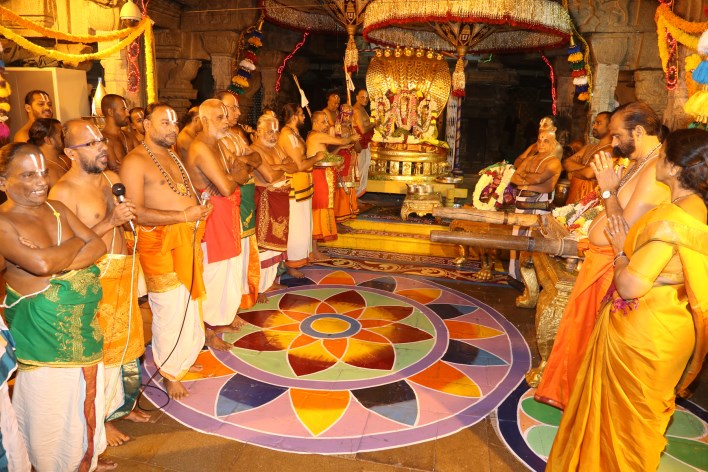


A stampede at Tirupati's Vaikuntha Dwara Darshan ticketing center left four devotees dead and several injured. Despite being in the vicinity of a major religious site, the incident highlights the lack of effective crowd management and safety protocols. Multiple investigations have been launched into the tragedy, with promises of compensation and structural reform to avoid future incidents.
Tirupati Stampede Tragedy: A Shadow over Pilgrimage
On January 14, 2023, a stampede at the Vaikuntha Dwara Darshan ticketing center in Tirupati, Andhra Pradesh, claimed the lives of four devotees and left several injured. The incident, which occurred during the peak pilgrimage season, has raised serious questions about crowd management and safety protocols at the revered temple town.
Background
Tirupati is home to the famous Tirumala Venkateswara Temple, one of the most visited pilgrimage sites in India. Millions of devotees flock to the temple every year, especially during auspicious occasions like the Vaikuntha Ekadasi festival, which was underway at the time of the stampede.
The Vaikuntha Dwara Darshan is a special queue system that allows devotees to enter the sanctum sanctorum of the temple through a designated gate. Due to the high demand, tickets for the Vaikuntha Dwara Darshan are issued through a lottery system.
Tragic Events
On the day of the stampede, thousands of devotees had gathered at the ticketing center for a chance to win the Vaikuntha Dwara Darshan tickets. Eyewitnesses reported chaos and mismanagement as people rushed to secure a ticket.
According to police reports, a sudden surge in the crowd resulted in a stampede. Four devotees, identified as Sri Lakshmi (63), Sri Rathna Bai (58), Sri Girija Devi (63), and Sri Vara Prasadam (45), were killed in the incident. Several others sustained injuries.
Aftermath
The stampede sent shockwaves through the temple town and beyond. Multiple investigations have been launched into the tragedy, with the state government promising compensation to the victims' families and structural reforms to enhance safety.
The temple authorities have taken immediate steps to improve crowd management measures, including limiting the number of people allowed in the ticketing area and installing additional safety barriers.
Top 5 FAQs
1. What caused the stampede? A: The cause of the stampede is still under investigation, but it is believed to have been triggered by a sudden surge in the crowd.
2. How many people died in the stampede? A: Four devotees lost their lives in the incident.
3. How can we prevent future stampedes at Tirupati? A: The temple authorities are working to implement stricter crowd management measures, such as limiting the number of people allowed in the ticketing area and installing additional safety barriers.
4. What is being done to help the victims and their families? A: The state government has promised compensation to the victims' families and medical assistance to the injured.
5. What are the past incidents of stampedes at Tirupati? A: There have been several past incidents of stampedes at Tirupati, including the following: * In 2011, a stampede at the temple during the Vaikuntha Ekadasi festival left two devotees dead and over 20 injured. * In 2015, a stampede at the same festival resulted in the death of one devotee and injuries to several others.
The Tirupati stampede tragedy highlights the need for effective crowd management and safety protocols at major religious sites. By learning from past incidents and implementing comprehensive safety measures, we can reduce the risk of such tragedies in the future.

The leaders of five European countries, including PM Keir Starmer and Ukrainian President Volodymyr Zelensky, gathered in London to address the ongoing war in Ukraine. Starmer declared that Russian President Vladimir Putin is not serious about pursuing peace, while Zelensky thanked the US for imposing new sanctions on Russia. Outside of the summit, Ukrainians shared their experiences and fears of living in a warzone.

India and the US are on the verge of finalizing a trade deal, with both sides making significant progress and ironing out most issues. Union Minister of Commerce and Industry, Piyush Goyal, clarified that India will not succumb to pressure and will only enter into a deal that is fair and beneficial for both countries. Furthermore, Goyal emphasized that India's approach is driven by a long-term vision, rather than momentary pressure or deadlines.

Delhi Police has arrested two ISIS operatives who planned to carry out blasts during Diwali celebrations in South Delhi. The suspects were reportedly radicalised online and had conducted recce of busy locations to inflict maximum casualties. Police believe the accused were in touch with foreign handlers and are looking into potential links to Pakistan's ISI. Investigations are ongoing to determine if the suspects have attempted to recruit others in Delhi and Bhopal.

In recognition of World Polio Day, Navi Mumbai joined the global effort to eradicate the paralyzing and vaccine-preventable disease by hosting an End Polio Now Laser Display. This initiative, organized by the Rotary Club of Navi Mumbai Joy of Giving, in collaboration with various organizations, aims to raise awareness and support for the cause. Despite significant progress, vigilance and continued commitment are still crucial to achieve a polio-free world.

The US and Australia have signed a deal to boost cooperation on rare earths and critical minerals, with the goal of reducing dependence on China. Australian Prime Minister Albanese has pledged to invest billions in crucial projects in the next six months as part of the agreement. Trump also emphasized the importance of the Aukus defense pact with Australia and the UK, stating that it serves as a deterrent against China. The deal is now moving forward quickly, with only minor clarifications left to be made.

Top US officials, including Vice President JD Vance and Secretary of State Marco Rubio, have spoken out against the Israeli parliament's vote to annex the already-occupied West Bank. Vance called the vote a "stupid political stunt" that could harm ongoing efforts towards a ceasefire and peace deal. Rubio warned that the move could jeopardize President Trump's plan to end the conflict. Despite the Knesset's approval, both officials reiterated that it is not the policy of the US to support annexation of the West Bank by Israel.

Pannir Selvam, a 28-year-old Malaysian man, received the death sentence in Singapore after being convicted of drug trafficking. Pannir's family, who remember him as a playful and talented musician, were shocked to hear of his arrest and have been fighting for his release ever since. With Singapore's strict laws against drug trafficking, Pannir's fate now lies in the hands of the court.

The FBI announced the arrest of Cindy Rodriguez Singh, one of its 'top 10 most wanted fugitives', from India in connection with the murder of her six-year-old son. She was charged with Unlawful Flight to Avoid Prosecution and Capital Murder. Patel commended the Indian and US agencies for their coordination in the case and noted that this is the fourth '10 Most Wanted' fugitive arrested in the past seven months. Singh's son had severe health and developmental issues and she allegedly fled to India to avoid prosecution, but justice knows no borders and the FBI never gives up on those who harm the innocent.

In a significant move, the descendants of Netaji Subhas Chandra Bose have urged Prime Minister Narendra Modi to institute a tradition of hoisting the National Flag at the Red Fort every year, to commemorate the establishment of the Azad Hind Government on October 21. The Azad Hind Government, formed under Netaji's leadership, played a key role in the fight for India's independence during World War II. With the 82nd anniversary of its establishment approaching, this request holds even more significance in honoring the sacrifices made by the Azad Hind Fauj.

Prime Minister Narendra Modi spent Diwali in an unconventional manner, celebrating the festival of lights with Indian Navy personnel onboard the aircraft carrier INS Vikrant. During his visit, Modi praised the INS Vikrant as a symbol of Aatmanirbhar Bharat and also witnessed a stunning air power demo by MiG 29K fighter jets taking off and landing on the short runway of the aircraft carrier. Modi was also deeply moved by a special cultural performance by the sailors, dedicated to the success of the Indian Armed Forces. He ended the evening by joining in the tradition of Bara Khana with the naval personnel. On the next day, Modi joined a yoga session on deck and watched a spectacular steampast of warships and flypast by aircraft.